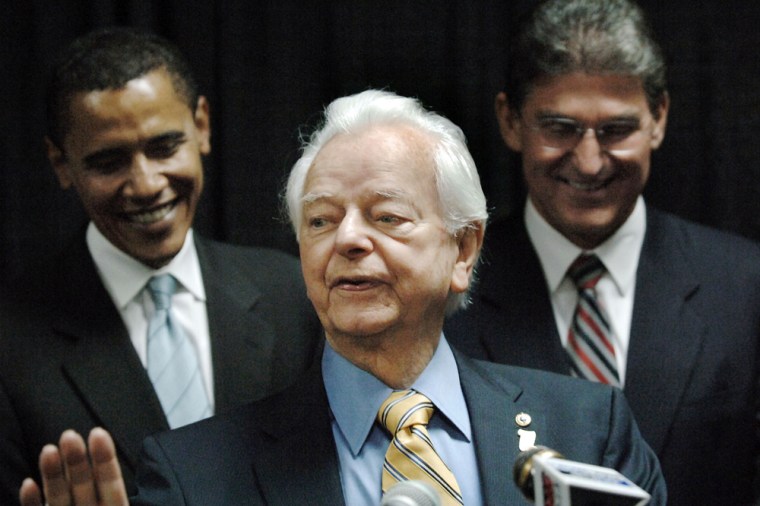Sen. Robert Byrd, D-W.V., is an institution. He's the longest serving senator in U.S. history. He's also 88 years old, and if he wins re-election -- he's the clear favorite in his race -- he'll be 95 at the end of his ninth term.
But Byrd isn't alone. Also up for re-election is Sen. Daniel Akaka, D-Hawaii, who is 82 and would be 88 at the end of his third term, if re-elected. And over in the House, the 83-year-old Rep. Ralph Hall, R-Texas, is running for a 14th term.
Congress, in fact, is the grayest it's ever been, and don't expect this to change much after the November midterms. The average age of a senator is 60 (the oldest ever) and the average age of a member of the House is 55 (the oldest in more than a century).
The aging Congress, experts say, is partly a reflection of more members -- like Byrd and Akaka -- deciding to stay in office for their own personal reasons. But it's also a reflection of their political parties wanting them to stay. "What is indisputable is that both parties are begging their incumbents to continue serving, regardless of age," Larry Sabato, director of the University of Virginia's Center for Politics, wrote at the beginning of this election cycle.
The reason why is because they're usually shoo-ins to win re-election. Traditionally, no matter how old they are, incumbents have the advantages: Voters know them, they get more media exposure, they can boast about their accomplishments in Congress, and they have access and connections to campaign cash -- all of which are ingredients to a successful campaign.
And with the power of Congress at stake in the upcoming midterms, both political parties have persuaded their incumbents to run for re-election. As evidence, there are only 33 open House and Senate seats this election, the lowest number in decades.
But can old age be a political liability? Not really, the experts say. "Age doesn't seem to matter very much to the voters," observed Norm Ornstein, a scholar at the conservative-leaning American Enterprise Institute. "For example, someone who will win in a slam dunk this November is Sen. Byrd. But one of the other most celebrated senators is Sen. Barack Obama, and you don't hear anybody knocking because he's too young."
Playing the age card
Indeed, Byrd's opponent -- the Republican John Raese -- has been reluctant to make the senator's age a campaign issue. That was until an ironic surrogate, former GOP West Virginia Gov. Cecil Underwood, played the age card last month while stumping for Raese. Underwood, who is 83 and has been in and out of the hospital over the past year, stated: "I thought it was time for a younger generation to step in... The odds are against [Byrd]."
Byrd, who needs the assistance of two canes to walk but has had no serious health problem, replied, "My inability is zero except for a problem with my legs. It has nothing to do with what is between my ears or my zest."
Old age also didn't stop the late U.S. Sen. Strom Thurmond, R-S.C., from winning re-election in 1996. In that race, polls found that most South Carolina voters thought he was too old and shouldn't be running. But the same polls showed majorities saying they would vote for him anyway. Thurmond easily won re-election and retired in 2003, shortly after his 100th birthday.
But is the graying Congress affecting its ability to get things done? "Well, that's the age old question, no pun intended," Sabato said. On the one hand, he says, a seasoned congressman can have the knowledge and the resources to get things done quicker. "The downside to that is an older Senate is at least one generation behind the rest of the country."
Yet incumbents, regardless of their age, are generally tough to beat. This year, however, that may not be so true. Already, a handful of incumbents - Sen. Joe Lieberman, D-Conn., Gov. Frank Murkowski, R-Alaska, and Rep. Cynthia McKinney, D-Ga. -- lost their primaries. And incumbents from Pennsylvania and New Jersey to Montana and Ohio appear to be in danger of losing their seats this November, age not withstanding.
One thing is for sure, however: Regardless of how many incumbents are ousted, the average age of Congress won't change much. "Even if a substantial number of incumbents are beaten, you're only going to see this median age drop ever so slightly," Sabato said.
Jennifer Colby is an intern at NBC News.
